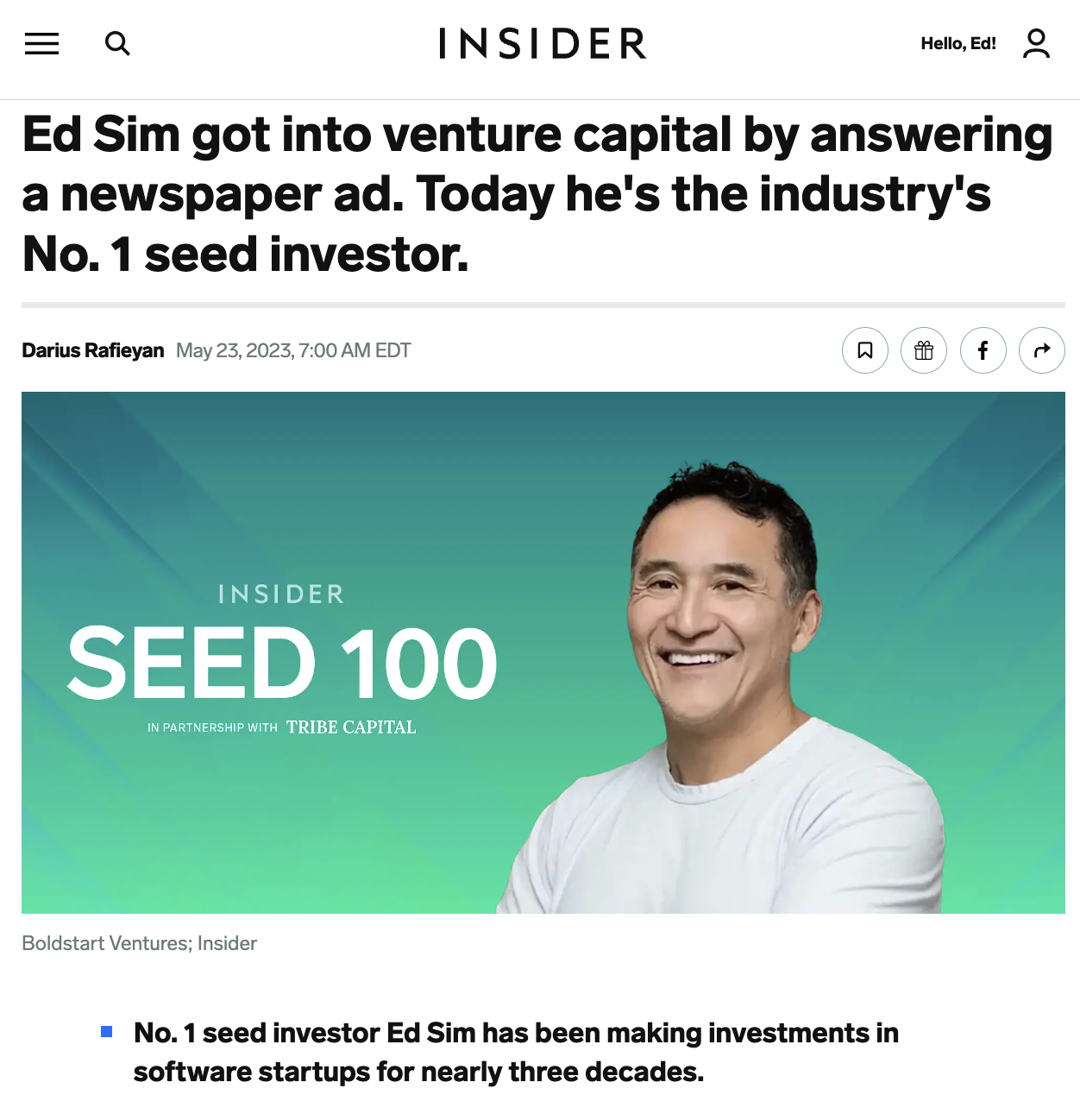Ed Sim got into VC by answering a newspaper ad. Today he’s the industry’s No. 1 seed investor (Insider).

- No. 1 seed investor Ed Sim has been making investments in software startups for nearly three decades.
- He looks for technical founders and knows whether he’ll invest in the first few minutes of a pitch.
Ed Sim has been a seed-stage investor since long before that was even a thing in Silicon Valley.
The year was 1996. At the time, he was living in New York and working as a low-level analyst at JPMorgan, using his rudimentary knowledge of Visual Basic to automate most of his job functions.
His moment of clarity came when he first laid eyes on the Mosaic web browser, the precursor to the modern internet experience.
“It was just the most mind-blowing thing I’d ever seen,” Sim told Insider.
In that moment, he decided he wanted to help back the software that would power the future. So 3,000 miles from venture capital’s mecca, Sand Hill Road in Silicon Valley, Sim set out to become a venture capitalist.
He mailed 100 letters to 100 VC funds, receiving just one response, which told him politely to go away. Eventually, he came across an ad in The Wall Street Journal for an associate position at a VC firm.
“I literally faxed my résumé in, and an hour later someone called me,” he said.
Two weeks after that, he turned down offers from Booth and Wharton to join Prospect Street Ventures, an early-stage fund backed by the New York City government.
Today, Sim is the founder and a general partner of Boldstart Ventures, and since answering that newspaper ad, he’s deployed billions of dollars in seed funding to enterprise-software startups. He jumped 26 spots this year to claim the top position on Insider’s Seed 100 list.
In 2022, Boldstart saw a number of successful exits, including Catalytic and Sling, and the firm made follow-on investments in many of its unicorn portfolio companies, such as Snyk and Blockdaemon.
After two years as a vice president at Prospect Street Venture, Sim founded Dawntreader Ventures, a New York seed-stage investment fund, at a time when neither New York nor seed investing were taken very seriously by the tech community.
“People were laughing at us. It was impossible for us to raise money, right?” he said. “No one believed in the story, no one believed in the New York ecosystem.”
‘Day one partner’
He doesn’t especially like the term “seed-stage investor,” instead referring to himself as a “day one partner.” He strives to be a company’s very first investor, and Boldstart focuses on building relationships with prospective founders years before they even think about starting a company.
What he looks for is a technical founder who understands a problem inside and out but who may not always be the most polished — “more steak than sizzle,” he calls it. And after nearly three decades as an investor, Sim says he pretty much knows it when he sees it.
“It’s the ones where within the first two or three minutes, you’re just like, holy shit, this is ready to go. Those are the ones that make the most sense,” he said.
While many VC investors emphasize their lengthy diligence process and data-driven investment strategy, Sim said he’s not all that concerned about quantitative metrics.
“If you start talking to me in markets and — I don’t give a shit. I’m not interested in that. I want to understand about the user. How are you going to make their life 10 to 100 times better,” he said.
Ultimately, Sims said, he’s stuck with seed-stage investing — one of the riskiest corners of the venture universe — because of the joy he gets in helping founders with nothing but an idea build something.
In 2020, Kustomer, a relationship-management platform that Sim backed early on, was acquired by Meta in a deal that valued the company at more than $1 billion. He remembers taking the founders out to dinner to celebrate the deal.
“Just seeing the smiles on their faces, that, to me, is why we do it over and over again,” he said.
